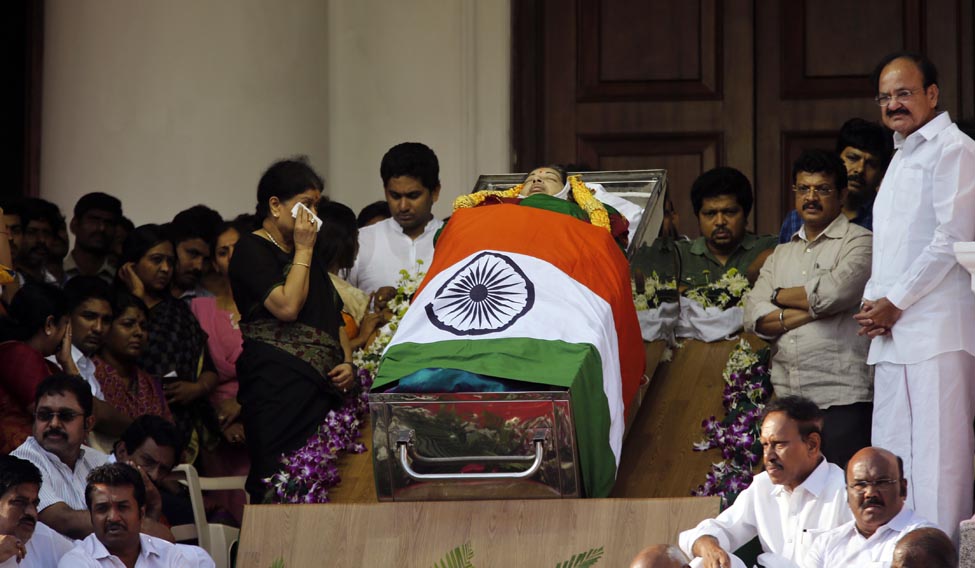Three months after her death, former chief minister Jayalalithaa’s health report was made public on Monday by the Tamil Nadu government. The report says Jayalalithaa suffered asthmatic bronchitis, a pre-cardio situation, and no external injuries. Senior ministers O. Panneerselvam, Vijayabhaskar, Deputy Speaker M. Thambidurai and V.K. Sasikala gave their consent for removing the Extracorporeal Membrane Oxygenation—a life support system—which led to natural cessation of life, it says.
The report was made public after questions were raised from several quarters on Jayalalithaa's treatment and the mystery prevailed over it. Releasing the 12 page discharge summary from Apollo Hospitals and AIIMS doctor’s report, Tamil Nadu’s principal secretary to health and family welfare said, “high quality care was given to the former chief minister.”
The discharge summary from Apollo hospital, which was handed over to the Tamil Nadu government in January this year, also reveals that the cause of death was “ventricular fibrillation, infective endocarditis and acute respiratory distress syndrome.” It says Jayalalithaa suffered asthmatic bronchitis and pulmonary odema and pre-cardio situation.
The discharge summary gives the names of 17 doctors at Apollo who treated her, names of those in the critical care unit expert team and names of the six doctors from AIIMS and 12 other experts, from whom expert opinion was taken. It says that expert opinion was taken from Dr K.M. Cherian and Dr Richard Beale were also part of her medical team. There were doctors from TATA Memorial Hospital Bombay, CMC Vellore, Hinduja Hospital Mumbai, Johns Hopkins Hospital USA and Apollo Hospitals in Hyderabad and Bengaluru.
The discharge summary clearly states that she was into fever five to seven days prior to admission and she had a history of intermittent fever. “Initial set of blood cultures was suggestive of growth of Enterococcus, a bacteria that causes urinary tract infections,” says the report.
The report further says that the Apollo hospital received a call around 10 pm on September 22, 2016 from Jayaalithaa’s house. When the ambulance reported there, she was breathless with low oxygen saturation resulting in drowsiness. The report however denies the theory of Jayalalithaa being pushed down before hospitalisation, as claimed by the Panneerselvam camp.
According to the discharge summary, "There were pre-existing co-morbidities like diabetes, hypertension, asthmatic bronchitis and hypothyroidism.” Also, she had atopic dermatitis, which according to medical experts, is a chronic eczematous skin disease. She was into corticosteroids.
At a time when there are questions being raised from several quarters over wrong medicines allegedly administered on her before hospitalisation, the report clearly mentions that except for corticosteroids administered for atopic dermatitis, Jayalalithaa was taking oral hypoglycemic and anti-hypertensive drugs to control pre-existing diabetes mellitus and hyper tension.
The discharge summary comprises day wise report from September 22 to December 5. Some of the key points in the report are below
>> Jayalalithaa was admitted on September 22, 2016 with breathlessness. She was treated for pre-cardiac arrest situation and subsequently a temporary transvenous pacemaker was emergently inserted.
>> Initial set of blood cultures suggested growth of Enterococcus, a bacteria that causes urinary tract infections.
>> She slowly started recovering and her requirements for a non-invasive ventilator had reduced.
>> Her health deteriorated when she developed a significant wheeze—tachypnoea, or rapid breathing.
>> On September 28, her breathing condition deteriorated further. After obtaining permission from family and government officials, she was placed on ventilator.
>> A panel of cardiologists including Dr M.R. Girinath, Dr K.M. Cherian, and Dr L.H. Sridhar recommended continuation of her medical therapy as there was no indication for any emergency surgery.
>> On September 30, her condition worsened despite various treatments provided. It required escalation of sedation and oxygen supplementation.
>> Dr Richard Beale from the UK was invited by Apollo for consultation. After coming in he opined that Jayalalithaa’s mortality was only 40 percent.
>> Over the next few days her health condition kept fluctuating
>> Her kidneys started failing by October 9 and her urine output also went down. Family suggested Apollo to obtain external opinion from an expert cardiologist. So Dr Stewart Russel from John Hokins Hospital and Dr Jayan Paramsehwar from Papworth, the UK were consulted. Her breathlessness was because of a diastolic heart failure—a condition due to which there isn't enough blood in the lower left chamber of her heart, according to them
>> She also had capiallry leak syndrome—a rare disorder.
>> The Tacheostomy tube was subsequently removed in the first week of November. Took oral food and was into IV fluids
>> And by November 19, she was moved out of ICU to a specially designed high dependency bed.
>> An hypertension expert from the Apollo Institute of Blood Pressure Management, Hyderabad, was consulted to suggest treatment to manage her episodic hypertension.
>> On the evening of December 4, 2016, even while the intensivist from the Apollo Hospital was in her room, Jayalalithaa was administered resuscitation and provided ECMO support within an hour.
>> Every possible clinical attempt was made to sustain her revival as per prescribed medical protocols.
>> A team of doctors, including experts from Apollo and AIIMS assessed the situation.
“It was clinically concluded that there was no heart function and there was also no neurological improvement denoting futility of life support. Hence, after following all procedures the position was conveyed to senior Ministers and Political Leaders (Thiru O Panneerselvam, DrVijayabhaskar, Thiru M. Thambidurai), MsSasikala, andGovernment Officials (Chief Secretary and Health Secretary). All of them understood the situation and asked the medical team to act as per the standard protocol. The late Hon’ble Chief Minister passed away at 1130 PM on 5.12.2016,” says the discharge summary.





